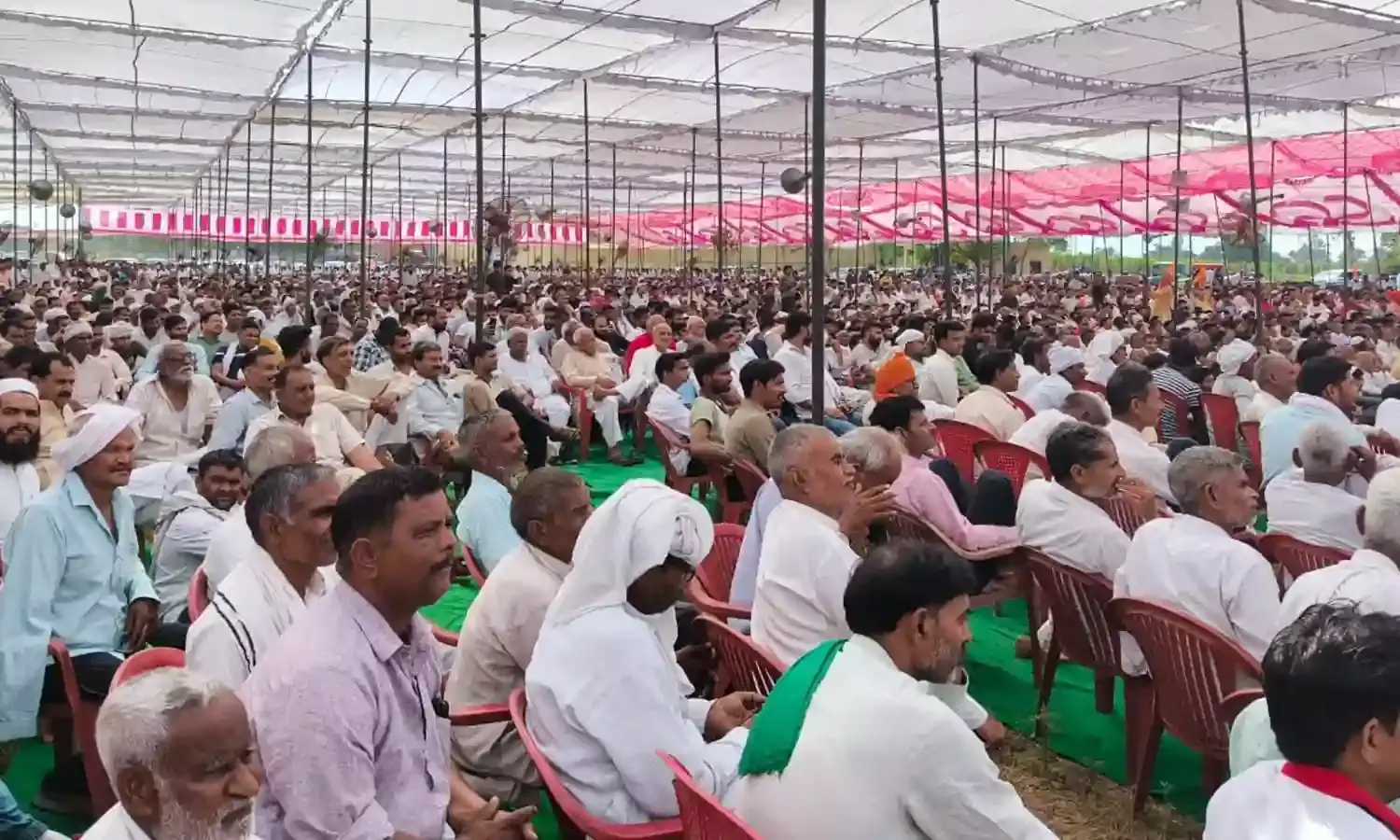Rajputs Of Western Uttar Pradesh Up In Arms Against BJP
Polls 2024

The Rajput community of western Uttar Pradesh has given a call to boycott the Bharatiya Janata Party (BJP), and strategically vote for the candidate who is in a position to defeat the saffron party’s candidate.
The simmering anger against the ruling party found expression during a ‘Swabhiman Mahapanchayat’ convened by the National President of Kisan Mazdoor Sangthan Thakur Pooran Singh in Kheda village of Muzaffarnagar Lok Sabha constituency on April 16. This Mahapanchayat was held three days before the casting of votes of the first phase of election on April 19.
The Swabhimaan Mahakumbh in Saharanpur’s Nanauta on April 7 has triggered many similar small meetings and panchayats of the disgruntled Thakur community who have vowed to defeat the BJP. The massive mahapanchayat at Kheda is the latest, but apparently not the last.
The Kheda Mahapanchayat reportedly had representation from ‘Chaubisa’, in other words, Rajput representatives of 24 predominantly Thakur villages of Muzaffarnagar district. The organisers claimed that angry Thakurs from neighbouring divisions of Saharanpur, Meerut and even Haryana, Uttrakhand, Rajasthan and Delhi had participated in the mahapanchayat in large numbers.
“We have pledged to completely boycott the BJP candidates in our respective constituencies”, Singh said, spelling out the purpose of the mahapanchayat. “This boycott of the BJP is primarily due to the unfair distribution of tickets ignoring the interests of the Thakur community. This is an outright insult of this proud community for which ‘samman’ (honour) is above everything,” added he.
Ostensibly, the shrinking political representation of Thakurs and the corresponding political and social ascendency of Jats and Gujjars is believed to be the cause of the Thakur rage. However, there are other hidden reasons, more of which later.
Since last year there has been a simmering discontent over the Gujjar community’s attempt, to what the Rajputs describe as “appropriating the legacy of the 9th Century King Mihir Bhoj” who has been referred to as ‘Gurjar Pratihar Samrat Mihir Bhoj’ in a plaque of a statue unveiled by Kaithal district BJP leaders in Haryana last year.
Around 47 Rajput office bearers of the Haryana BJP state office had submitted their resignation in protest. Massive mobilisation by the Rajput community had started in Haryana.
They went village to village to make them aware of their history and culture. It culminated in a mahapanchayat against the ruling BJP government on September 10, 2023.
The discontent over stealing of their legacy soon spilled over to neighbouring Uttar Pradesh in what can best be described as a classic example of conflicting interests and appropriation of myth, history and identity, crucial for caste-based politics.
Things took a turn for the worst when former Army Chief V. K. Singh was denied the Ghaziabad Lok Sabha seat for no apparent reason. The ticket has gone to Atul Garg, representing the Bania community.
Ghaziabad was almost considered a reserved constituency for Thakurs ever since it came into existence in 2008. In 2009 Rajnath Singh won from Ghaziabad and then in 2014 V. K. Singh had won with 61.93 percent of vote share, and in 2019 by 56.51 percent of the votes.
Demanding better representation for Rajputs in western Uttar Pradesh Rashtriya Rajput Karni Sena representative at the Kheda mahapanchayat declared that BJP would have to pay the price.
Of the eight seats going to vote during the first phase of elections on April 19 only one seat has a Thakur candidate. He is the BJP candidate Sarvesh Singh in Moradabad. He had lost to Samajwadi party’s T. Hasan in 2019 from the same seat.
After the defeat of two Thakur MLAs in 2022, Suresh Rana and Sangeet Som, the representation of the Thakurs in the UP Vidhan Sabha has also diminished. There are only two Thakur MLAs in the 34 seats of Saharanpur, Meerut, Shamli, Muzaffarnagar, Baghpar, Gautam Buddha Nagar and Ghaziabad.
In Muzaffarnagar, the Thakurs are hugely upset with local BJP MP and union minister for Animal Husbandry, Dairying and Fisheries Sanjeev Balyan, a Jat, for not being available to them. He reportedly hurt their pride when he declared that only Jats were farmers while all other communities were farm labourers.
“We are not unhappy with Modi or Yogi. But we want Sanjeev Balyan out” a Thakur farmer said. The sentiment is echoed by the others across the districts where the Thakur community is up in arms against the local BJP candidate but is not expressing the same sentiment for the top central or state leadership.
“See where Balyan is and how Rana and Sangeet Som are in political wilderness. If Keshav Prasad Maurya can be made the deputy chief minister after losing his Vidhan Sabha seat couldn’t the party similarly rehabilitate these Thakur leaders as well?”, a Thakur leader at the Mahapanchayat asked.
The visible cause for the anger against the BJP is that the landed Thakur community at one level is feeling short changed as compared to the equally prosperous Jat and Gujjar community which in UP are part of the Other Backward castes and have their fair share of political representation and job reservation.
However, factionalism within the BJP cannot be completely ruled out for this public outrage of the Thakurs against the BJP. Factors like the agrarian distress, lack of unemployment opportunities, paper leaks of government recruitment examinations have pushed the youth to the wall.
In spite of this, they are not articulating these reasons for their anger against the saffron party. Their wrath is focused on the shrinking political representation of the Thakurs and the Thakur Chief Minister Adityanath not having his way in the distribution of tickets in Western Uttar Pradesh.
Substantiating this connection, a local leader pointed to the huge gathering of Thakurs at the Mahapanchayats despite the model code of conduct in place, and all of the state under CrPC Section 144 which prohibits the assembly of four or more people in an area.



